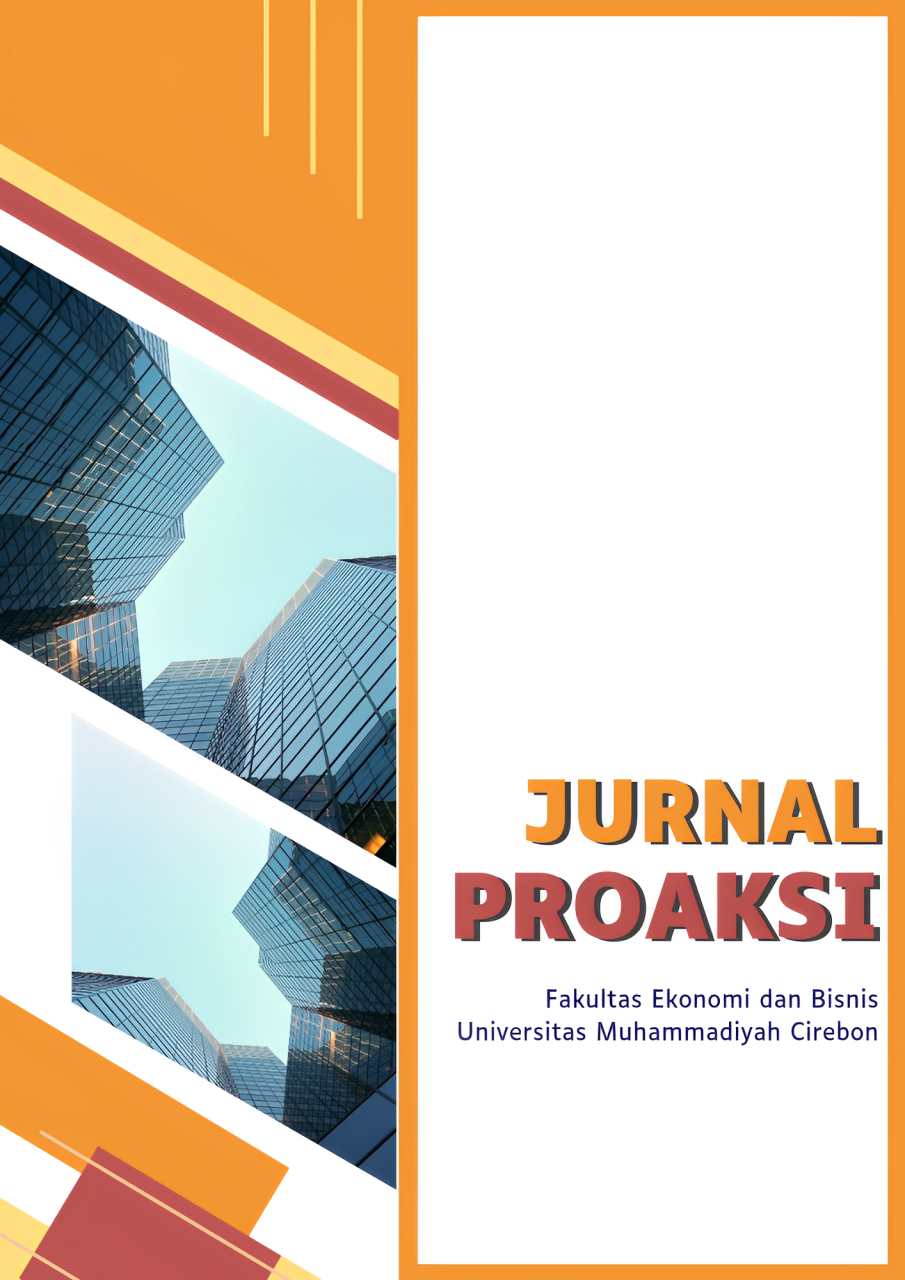Pengaruh Corporate Sustainable Performance Terhadap Comprehensive Financial Performance
DOI:
https://doi.org/10.32534/jpk.v12i1.6767Keywords:
Corporate Sustainable Performance, ESG Score, ROA laba bersih, ROA laba komprehensif, ROE laba yang diatribusiAbstract
Tujuan Utama – Penelitian ini bertujuan untuk menguji pengaruh Corporate Sustainable Performance yang diproksikan dengan ESG Score terhadap Comprehensive Financial Performance yang diukur dengan ROA laba bersih, ROA laba komprehensif, dan ROE laba yang diatribusi.
Metode – Penelitian ini menggunakan pendekatan kuantitatif dengan teknik analisis regresi linier berganda. Sampel terdiri dari 127 perusahaan yang terdaftar di Bursa Efek Indonesia periode 2020–2023 dengan total 497 data observasi.
Temuan Utama – Hasil penelitian menunjukkan bahwa ESG Score berpengaruh positif signifikan terhadap ROA berbasis laba bersih, ROA berbasis laba komprehensif, dan ROE berbasis laba yang diatribusi. Artinya, semakin tinggi kinerja keberlanjutan perusahaan, semakin baik pula kinerja keuangan komprehensifnya. Capaian kinerja ESG yang optimal mendorong citra positif, peningkatan efisiensi operasional, serta akurasi informasi keuangan.
Implikasi Teori dan Kebijakan – Temuan ini memperkuat teori stakeholder bahwa keseimbangan perhatian pada aspek ekonomi, sosial, dan lingkungan berdampak positif pada kinerja perusahaan. Implikasi kebijakan mendorong perlunya penguatan komitmen keberlanjutan perusahaan serta transparansi dalam pengungkapan ESG.
Kebaruan Penelitian – Penelitian ini menawarkan kebaruan dengan menguji pengaruh ESG Score tidak hanya terhadap ROA laba bersih, tetapi juga terhadap ROA laba komprehensif dan ROE laba yang diatribusi sebagai bentuk pengukuran kinerja keuangan yang lebih menyeluruh dan relevan secara akuntansi.
Downloads
References
Achim, M. ., & Borlea, S. . (2015). Developing of ESG Score To Assess The Non-Financial Performances In Romanian Companies. Procedia Economics and Finance, 32(2015), 1209–1224. https://doi.org/10.1016/S2212-5671(15)01499-9
Agliardi, E., Alexopoulos, T., & Karvelas, K. (2021). Empirical Results The Environmental Pillar of ESG and Financial Performance: A Portfolio Analysis. Mendeley Data, 5, 17632. https://doi.org/http://www.doi.org/10.17632/2jsb9z3d69.5
Agustin, B. H., & Kusuma, M. (2024). Pengaruh Penghasilan Komprehensif Lain & Laba yang Diatribusikan Terhadap Audit Report Lag. Jurnal Proaksi, 10(4), 739–752. https://doi.org/10.32534/jpk.v11i4.6323
Ahmad, A., Mobarek, A., & Naheed, N. (2021). Revisiting the impact of ESG on Financial Performance of FTSE350 UK Firms: Static and Dynamic Panel Data Analysis. Cogent Business & Management, 8(1). https://doi.org/https://doi.org/10.1080/23311975.2021.1900500
Alareeni, B. ., & Hamdan, A. (2020). ESG impact on performance of US S&P 500-listed firms. Corporate Governance, 20(7), 1409–1428. https://doi.org/10.1108/CG-06-2020-0258
Athori, A., & Kusuma, M. (2023). Effect of Others Comprehensive Income on Company Value by Mediation of Retained Earnings: Evidence From Indonesia. JCA (Jurnal Cendekia Akuntansi), 4(2), 141. https://doi.org/10.32503/akuntansi.v4i2.4580
Basir, I., Ansari, M. I., & Fitriani, N. (2024). Sustainability reporting pada pemerintah daerah : sebuah analisis studi wacana. Jurnal Proaksi, 11(4), 805–816. https://doi.org/10.32534/jpk.v11i4.6481
Belli, M., Marques, F., Picoli, L., & Pedro, H. (2023). The Relationship Between ESG And Financial Performance: A Review of Research In Latin America and Worldwide. Latin American Journal of Management for Sustainable Development, 6(1), 84–107. https://doi.org/https://doi.org/10.1504/LAJMSD.2023.132367
Buallay, A. (2019). Is sustainability reporting (ESG) associated with performance? Evidence from the European banking sector. Management of Environmental Quality, 30(1), 98–115. https://doi.org/10.1108/MEQ-12-2017-0149
B?mane, I. (2018). The methodology of the statement of comprehensive income and its impact on profitability: The case of Latvia. Entrepreneurship and Sustainability Issues, 6(1), 77–86. https://doi.org/10.9770/jesi.2018.6.1(6)
Chen, S., Song, Y., & Peng, G. (2023). Environmental, Social, and Governance (ESG) Performance And Financial Outcomes: Analyzing The Impact of ESG on Financial Performance. Journal of Environmental Management, 345(118829). https://doi.org/10.1016/j.jenvman.2023.118829
Dakhli, A. (2022). The Impact of Corporate Social Responsibility on Firm Financial Performance: Does Audit Quality Matter. Journal of Applied Accounting Research, 23(5), 950–976. https://doi.org/10.1108/JAAR-06-2021-0150
Dalal, K. K., & Thaker, N. (2019). ESG and Corporate Financial Performance : A Panel Study of Indian Companies. The IUP Journal of Corporate Governance, 18(1), 1–16. https://doi.org/10.1108/iup.jcg.18.1.2019
Freeman, R. (1984). Strategic Management: A Stakeholder Theory. Journal of Management Studies, 39, 1–24. Retrieved from https://scholar.google.com/citations?view_op=view_citation&hl=en&user=ZcvIxwsAAAAJ&citation_for_view=ZcvIxwsAAAAJ:IRz6iEL74y4C
Gabriela, N., & Prabowo, T. (2024). Pengaruh ESG Terhadap Kinerja Keuangan Perusahaan dengan Manajemen Laba sebagai Variabel Mediasi. Diponegoro Journal Of Accounting, 13(1), 1–15. https://doi.org/http://doi.org/10.1011/dja.13.1.2024g
Hu, Y., Hassan, A., & Sehrish, A. (2024). Examining the Interplay between CEPSA’s ESG Performance and Financial Performance: An Overview of the Energy Sector Transformation. Sustainability, 16(7), 16072772. https://doi.org/https://doi.org/10.3390/su16072772
Hwang, J., Kim, H., & Jung, D. (2021). The Effect of ESG Activities on Financial Performance during the COVID-19 Pandemic—Evidence from Korea. Sustainability, 13(20), 11362. https://doi.org/https://doi.org/10.3390/su132011362
Jensen, M., & Meckling, W. (1976). Theory of The Firm: Managerial Behavior, Agency Costs and Ownership Structure. Journal of Financial Economics, 3, 305–360. https://doi.org/10.1177/0018726718812602
Kalia, D., & Aggarwal, D. (2023). Examining Impact of ESG Score on Financial Performance of Healthcare Companies. Journal of Global Responsibility, 14(155–176), https://doi.org/10.1108/JGR-05-2022-0045.
Khoury, R. E., Nasrallah, N., & Alareeni, B. (2023). ESG and Financial Performance of Banks in the MENAT Region: Concavity–Convexity Patterns. Journal of Sustainable Finance & Investment, 13(1), 1–20. https://doi.org/https://doi.org/10.1080/20430795.2021.1929807
Kusuma, M. (2021a). Measurement of Return on Asset (ROA) based on Comprehensive Income and its Ability to Predict Investment Returns: an Empirical Evidence on Go Public Companies in Indonesia before and during the Covid-19 Pandemic. Ekuilibrium : Jurnal Ilmiah Bidang Ilmu Ekonomi, 16(1), 94. https://doi.org/10.24269/ekuilibrium.v16i1.3238
Kusuma, M. (2021b). Modification of Profitability Measures with Comprehensive Income and Reclassification of Other Comprehensive Income as A Mediation of Effects Asset Utilization on Firm Value. Jurnal Keuangan Dan Perbankan, 25(4). Retrieved from file:///C:/Users/USER/Downloads/6132-21824-1-PB.pdf
Kusuma, M. (2021c). Modification of Profitability Measures with Comprehensive Income and Reclassification of Other Comprehensive Income as A Mediation of Effects Asset Utilization on Firm Value. Jurnal Keuangan Dan Perbankan, 25(4), 855–879. https://doi.org/10.26905/jkdp.v25i4.6132
Kusuma, M. (2023a). Can the Reclassification of Others Comprehensive Income Narrow Opportunities for Creative Accounting: Earnings Management and Income Smoothing? Jurnal Akuntansi Dan Keuangan, 25(1). https://doi.org/10.9744/jak.25.1.25-38
Kusuma, M. (2023b). Nilai Relevansi Lima Item Parsial Penghasilan Komprehensif Lainnya (OCI) Dalam Kondisi Fundamental Makro Ekonomi Terdampak Covid-19. In G. Chandrarin (Ed.), Book Chapter : Kajian Tentang Penerapan Akuntansi Di Era Digitalisasi dan Pandemi Covid-19 (1st ed., pp. 1–24). Dimar Intermedia. Retrieved from https://scholar.google.com/scholar?cluster=16174121922158947157&hl=en&oi=scholarr
Kusuma, M. (2023c). Pengaruh Kinerja Operasi, Entitas Anak dan Asosiasi Terhadap Laba dan Ekuitas yang Diatribusi : Bukti dari Indonesia. JCA (Jurnal Cendekia Akuntansi), 4(2), 120. https://doi.org/10.32503/akuntansi.v4i2.4579
Kusuma, M. (2024). Dapatkah Laba Komprehensif Digunakan untuk Memprediksi Financial Distress? TEMA: Jurnal Tera Ilmu Akuntansi, 25(1). Retrieved from https://tema.ub.ac.id/index.php/tema/article/view/838/258
Kusuma, M. (2020). Penghasilan komprehensif lain dan prediksi arus kas masa depan : Bukti dari Indonesia. Seminar Nasional SENIMA Ke 5 Universitas Negeri Surabaya, Senima 5, 815–832. Retrieved from http://bit.ly/ProsidingSenima5
Kusuma, M., & Agustin, B. H. (2023). Can Others Comprehensive Income Affect Dividend Payments In Indonesia? Share: Jurnal Ekonomi Dan Keuangan Islam, 12(1). Retrieved from https://jurnal.ar-raniry.ac.id/index.php/Share/article/view/15513
Kusuma, M., Assih, P., & Zuhroh, D. (2021). Pengukuran Kinerja Keuangan : Return on Equity ( ROE ) Dengan Atribusi Ekuitas. Jurnal Ilmiah Manajemen Dan Bisnis, 22(2), 223–244. https://doi.org/10.30596/jimb.v22i2.7935
Kusuma, M., Chandrarin, G., Cahyaningsih, D. S., & Lisetyati, E. (2022). Reclassification of Others Comprehensive Income, Earnings Management, and Earnings Quality : Evidence From Indonesia. Asia-Pacific Management Accounting Journal, 17(3), 205–237. https://apmaj.uitm.edu.my/index.php/current/20-cv17n3/165-av17n3-8
Kusuma, M., & Kusumaningarti, M. (2023). Earnings Response Coefficient ( ERC ) Berbasis Laba Komprehensif dan Laba Diatribusi : Modifikasi Teori Kandungan Laba ( Ball & Brown , 1968 ). Jurnal Ilmiah Akuntansi Manajemen, 6(2), 141–162. https://doi.org/10.35326/jiam.v6i2.4346
Kusuma, M., & Luayyi, S. (2024). Do others comprehensive income, profit, and equity attributable impact external audit fee? Journal of Accounting and Investment, 25(1), 112–136. https://doi.org/10.18196/jai.v25i1.20470
Kusuma, M., & Rahayu, P. (2022). Can Others Comprehensive Income Be Used For Tax Avoidance? Jurnal Akuntansi Dan Keuangan (JAK), 24(2), 68–79. Retrieved from https://jurnalakuntansi.petra.ac.id/
Kusuma, M., & Saputra, B. M. (2022). Pengaruh Fundamental Makro Ekonomi Terhadap Penghasilan Komprehensif Lain dan Persistensi Laba Komprehensif. Jurnal Kajian Akuntansi, 6(1), 145–176. Retrieved from file:///C:/Users/USER/Downloads/6132-21824-1-PB.pdf
Kusuma, M., Zuhroh, D., Assih, P., & Chandrarin, G. (2021). The Effect of Net Income and Other Comprehensive Income on Future’s Comprehensive Income With Attribution of Comprehensive Income as Moderating Variable. International Journal of Financial Research, 12(3), 205–219. Retrieved from https://eprints.unmer.ac.id/id/eprint/3361/
Lee, S., & Isa, M. (2023). Environmental, Social and Governance (ESG) Practices and Financial Performance of Shariah-Compliant Companies in Malaysia. Journal of Islamic Accounting and Business Research, 14(2), 295–314. https://doi.org/https://doi.org/10.1108/JIABR-06-2020-0183
López-Quesada, E., Camacho-Miñano, M. del M., & O. Idowu, S. (2018). Corporate governance practices and comprehensive income. Corporate Governance (Bingley), 18(3), 462–477. https://doi.org/10.1108/CG-01-2017-0011
Marchini, P. L., & D’Este, C. (2015). Comprehensive Income and Financial Performance Ratios: Which Potential Effects on RoE and on Firm’s Performance Evaluation? Procedia Economics and Finance, 32(January 2009), 1724–1739. https://doi.org/10.1016/s2212-5671(15)01478-1
Murdiyanto, E., & Kusuma, M. (2022). Moderasi Leverage dalam Pengaruh Ukuran Bank dan Aset Keuangan Terhadap Kinerja Keuangan Komprehensif BPR Konvensional dan BPR Syariah Se-Kediri Raya. Jurnal Ekonika : Jurnal Ekonomi Universitas Kadiri, 7(2). Retrieved from http://ojs.unik-kediri.ac.id/index.php/ekonika/index
Nareswari, N., Tarczy?ska-?uniewska, M., Umar, R., Hashfi, A., & Poland, A. (2023). Analysis of Environmental, Social, and Governance Performance in Indonesia : Role of ESG on Corporate Performance. Procedia Computer Science, 225, 1748–1756. https://doi.org/10.1016/j.procs.2023.10.164
Rahayu, S. M. (2019). Mediation effects financial performance toward influences of corporate growth and assets utilization. International Journal of Productivity and Performance Management, 68(5), 981–996. https://doi.org/10.1108/IJPPM-05-2018-0199
Safriani, M. N., & Utomo, D. C. (2020). Pengaruh Environmental, Social dan Governance (ESG) Disclosure terhadap Kinerja Perusahaan. Diponegoro Journal Of Accounting, 9(3), 1–11. https://doi.org/10.29313/bcsa.v4i1.11584
Saygili, E., Arslan, S., & Ozden, A. (2022). ESG practices and corporate financial performance : Evidence from Borsa Istanbul. Borsa Istanbul Review, 22(3), 525–533. https://doi.org/10.1016/j.bir.2021.07.001
Saymeh, A. A., Khalaf ALkhazaleh, A. M., & Musallam, E. M. (2019). The Impact of Other Comprehensive Income Items on Financial Performance: Case of Jordanian Commercial Banks. The Journal of Social Sciences Research, 5(54), 1216–1228. https://doi.org/10.32861/jssr.54.1216.1228
Shin, J., Moon, J., & Jingoo, K. (2023). Where does ESG pay? The Role of National Culture In Moderating The Relationship Between ESG Performance and Financial Performance. International Business Review, 32(3), 102071. https://doi.org/http://www.doi.org/10.1016/j.ibusrev.2022.102071
Velte, P. (2017). Does ESG performance have an impact on financial performance? Evidence from Germany. Journal of Global Responsibility, 8(2), 169–178. https://doi.org/10.1108/JGR-11-2016-0029
Zahroh, B., & Hersugondo, H. (2021). The Effect of ESG Performance on The Financial Performance of Manufacturing Companies Listed in The Indonesian. AFEBI Management and Business Review, 6(2), 129–139. https://doi.org/https://doi.org/10.47312/ambr.v6i2.475z
Downloads
Published
Issue
Section
License
Copyright (c) 2025 Agus Athori, Hanifah Puspita Sari, Marhaendra Kusuma, Yuniep Mujati Suaidah

This work is licensed under a Creative Commons Attribution 4.0 International License.




















